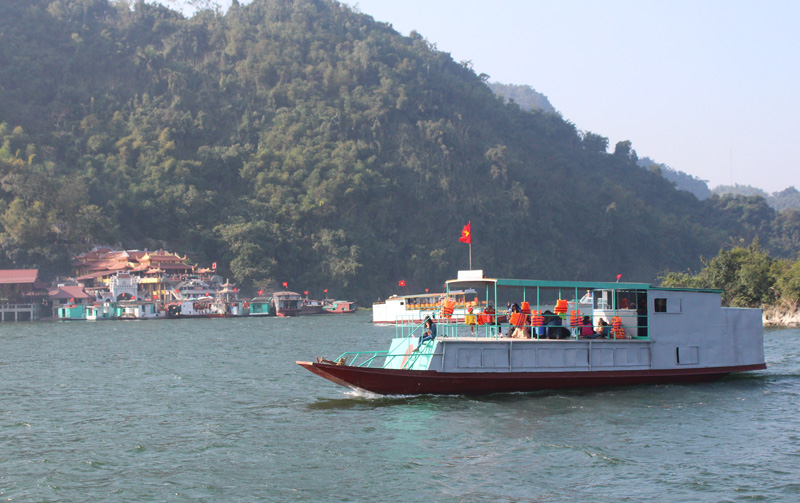
(HBO) – Hoa Binh province has what it takes to develop agri-tourism. The province is home to more than 88,400 hectares of agricultural land, including 4,700 hectares of citrus fruits, over 6,500 hectares of purple and green sugarcanes and 11,000 hectares of vegetables. It also has more than 4,700 cages of fish, mostly in the Hoa Binh Reservoir.
 Hoa Binh lake is a tourist destination.
Hoa Binh lake is a tourist destination.
Hoa
Binh is nationally renowned for a variety of agricultural specialties, such as
Cao Phong and Lac Thuy oranges, Tan Lac and Yen Thuy pomelos, Da River prawn
and fish, and purple sugarcane. Many orange farms in Cao Phong have strived to
make the most of their potential by combining agriculture and tourism.
It is
naturally blessed with scenic rolling limestone mountains and magnificent
caves, particularly Dau Rong caves and mountains in Cao Phong district, Tien
Pagoda’s caves in Lac Thuy district, Ngoi Hoa and Nam Son caves in Tan Lac district,
and Trung Son cave in Luong Son district; and a number of primitive tropical
forests as well as nature reserves, namely Pu Canh, Ngoc Son – Ngo Luong,
Thuong Tien, and Hang Kia – Pa Co.
The
popular Hoa Binh Reservoir, which has 47 islets and islands, is dubbed as Ha
Long Bay on land. It holds large potential for the locals to develop eco-tours
and adventure tours, most favoured by young people and foreign travelers.
The
province, which has a total population of 850,000, is one of the most
ethnically diverse province in Vietnam. It is inhabited by various ethnic
minority groups, such as Muong, Thai, Tay, Dao and Mong, which together account
for 74.31 percent of the population. The ethnic minorities have still preserved
centuries-old rich and distinctive cultures.
New
tourism services have been developed within small and cozy villages of local
ethnic minorities, attracting an increasing number of visitors, particularly
foreigners. Hoa Binh now has many well-known community-based villages and more
than 150 homestay facilities.
Hoa
Binh has also worked hard to maintain and restore traditional festivals of
ethnic minorities.
Fifty-seven
out of 131 communes in Hoa Binh have achieved new-style rural area status after
the new rural development programme was launched in the province 10 years ago.
Seven communes have meet advanced new-style rural area standards while 39
residential zones have been named as model ones.
The
province has been making all necessary steps for 58 local signature products to
be recognized as 3-star "One Commune, One Product” (OCOP) products, including
two in tourism./.
A diverse chain of eco-tourism and resort destinations concentrated in Hoa Binh city and the districts of Tan Lac, Da Bac, and Luong Son… Along with the launch of several key high-quality resort tourism projects, these developments have reshaped the landscape and enhanced the appeal of Hoa Binh as a travel destination.
Boasting diverse terrain, a mild climate, and rich natural resources, Cao Phong district is increasingly asserting its place on Vietnam’s tourism map, attracting both domestic and foreign visitors. The district is renowned for its stunning landscapes, majestic mountains, a crystal-clear hydropower lake, and the unique cultural identity of local ethnic groups.
With its pristine landscapes, unique cultural heritage of Muong ethnic minority, and an expanding range of visitor experiences, Tan Lac district of Hoa Binh has fast become a captivating destination for both domestic and international tourists.
Until now, Sung village in Cao Son commune, Da Bac district remains the only Dao ethnic community in Hoa Binh province to develop a community-based tourism model. Beyond its untouched natural landscapes, cultural identity serves as the cornerstone attraction for visitors.
Alongside the diverse cultural identities of the Kinh, Muong, Tay, Thai, Dao, and Mong ethnic people, Hoa Binh province is also renowned as the "capital" of the northwestern Vietnamese cuisine, offering unique and distinctive dishes. At festivals, during Lunar New Year (Tet), or on significant family or community occasions, special dishes are prepared, leaving a lasting impression on visitors.
A Phong Linh (Yellow Tabebuia) flower garden in Thang village, Thach Yen commune, Cao Phong district is currently in full bloom, drawing a large number of visitors.



 Hoa Binh lake is a tourist destination.
Hoa Binh lake is a tourist destination.